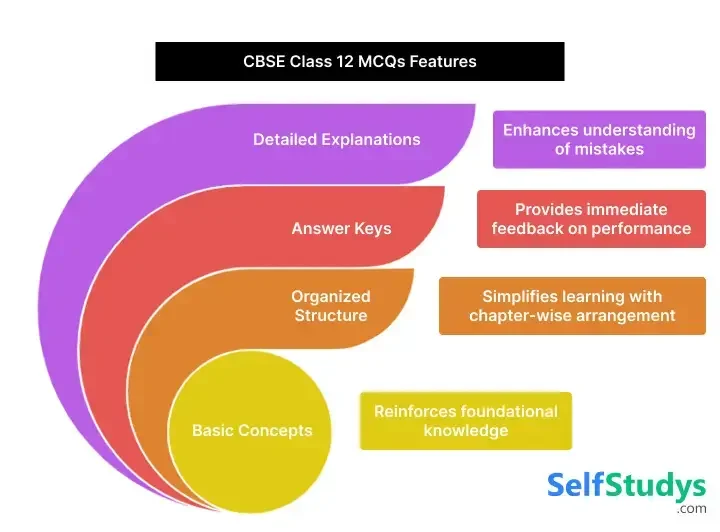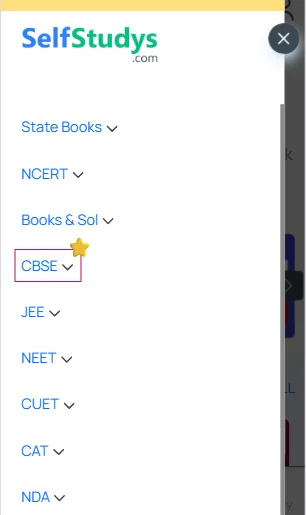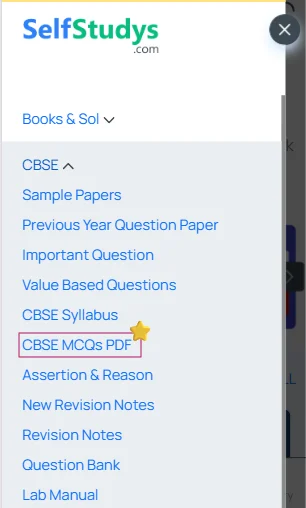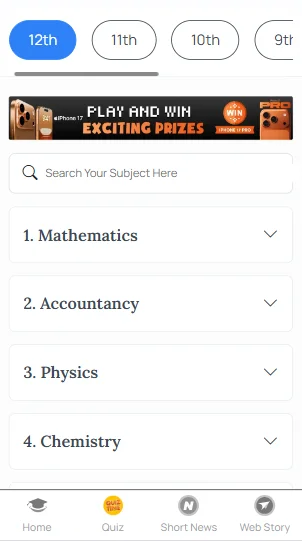-
1. Mathematics
- 1. Relations and Functions
- 2. Inverse Trigonometric Functions
- 3. Matrices
- 4. Determinants
- 5. Continuity and Differentiability
- 6. Application of Derivatives
- 7. Integrals
- 8. Application of Integrals
- 9. Differential Equations
- 10. Vector Algebra
- 11. Three Dimensional Geometry
- 12. Linear Programming
- 13. Probability
-
2. Accountancy
- 1. Accounting for Not for Profit Organisation
- 2. Accounting for Partnership Basic Concepts
- 3. Reconstitution of Partnership Firm Admission of a Partner
- 4. Reconstitution of Partnership Firm Retirement Death of a Partner
- 5. Dissolution of a Partnership Firm
- 6. Accounting for Share Capital
- 7. Issueand Redemption of Debentures
- 8. Financial Statements of a Company
- 9. Analysisof Financial Statements
- 10. Accounting Ratios
- 11. Cash Flow Statement
-
3. Physics
- 1. Electric Charges and Fields
- 2. Electrostatic Potential and Capacitance
- 3. Current Electricity
- 4. Moving Charges and Magnetism
- 5. Magnetism and Matter
- 6. Electromagnetic Induction
- 7. Alternating Current
- 8. Electromagnetic Waves
- 9. Ray Optics and Optical Instruments
- 10. Wave Optics
- 11. Dual Nature of Radiation and Matter
- 12. Atoms
- 13. Nuclei
- 14. Semiconductor Electronics Materials, Devices and Simple Circuits
-
4. Chemistry
- 1. Solutions
- 2. Electrochemistry
- 3. Chemical Kinetics
- 4. Surface Chemistry
- 5. General Principles and Processes of Isolation of Elements
- 6. The p-Block Elements
- 7. The d-and f-Block Elements
- 8. Coordination Compounds
- 9. Haloalkanes and Haloarenes
- 10. Alcohols, Phenols and Ethers
- 11. Aldehydes, Ketones and Carboxylic Acids
- 12. Amines
- 13. Biomolecules
- 14. Polymers
- 15. Chemistry in Everyday Life
- 16. Solid State
-
5. Biology
- 1. Reproduction in Organisms
- 2. Sexual Reproduction in Flowering Plants
- 3. Human Reproduction
- 4. Reproductive Health
- 5. Principles of Inheritance and Variation
- 6. Molecular Basis of Inheritance
- 7. Evolution
- 8. Human Health and Disease
- 9. Strategies for Enhancement in Food Production
- 10. Microbes in Human Welfare
- 11. Biotechnology Principles and Processes
- 12. Biotechnology and its Applications
- 13. Organisms and Populations
- 14. Ecosystem
- 15. Biodiversity and Conservation
- 16. Environmental Issues
- 6. Business Studies
-
7. History
- 1. Bricks, Beads and Bones
- 2. Kings, Farmers and Towns
- 3. Kinship, Caste and Class
- 4. Thinkers, Beliefs and Buildings
- 5. Through the Eyes of Travellers
- 6. Bhakti-Sufi Traditions
- 7. An Imperial Capital Vijayanagara
- 8. Peasants, Zamindars and the State
- 9. Kings and Chronicles
- 10. Colonialism and the Countryside
- 11. Rebels and the Raj
- 12. Colonial Cities
- 13. Mahatma Gandhi and the Nationalist Movement
- 14. Understanding Partition
- 15. Framing the Constitution
-
8. Indian Economic Development
- 1. Indian Economy on the Eve of Independence
- 2. Indian Economy 1950-1990
- 3. Liberalisation, Privatisation and Globalisation An Appraisal
- 4. Poverty
- 5. Human Capital Formation in India
- 6. Rural Development
- 7. Employment Growth, Informalisation and Other Issues
- 8. Infrastructure
- 9. Environment and Sustainable Development
- 10. Comparative Development Experiences of India and its Neighbours
- 9. Introductory Macroeconomics
- 10. Fundamentals of Human Geography
-
11. India People and Economy
- 1. Population Distribution, Density, Growth and Composition
- 2. Migration Types, Causes and Consequences
- 3. Human Development
- 4. Human Settlements
- 5. Land Resources and Agriculture
- 6. Water Resources
- 7. Mineral and Energy Resources
- 8. Manufacturing Industries
- 9. Planning and Sustainable Development in Indian Context
- 10. Transport and Communication
- 11. International Trade
- 12. Geographical Perspective on Selected Issues and Problems
- 12. Contemporary World
-
13. Politics in India Since Independence
- 1. Challenges of Nation Building
- 2. Era of One Party Dominance
- 3. Politics of Planned Development
- 4. India’s External Relations
- 5. Challenges to and Restoration of Congress System
- 6. The Crisis of Democratic Order
- 7. Rise of Popular Movements
- 8. Regional Aspirations
- 9. Recent Developments in Indian Politics
- 14. Flamingo (Prose)
- 15. Flamingo (Poems)
- 16. Vistas
CBSE has been including objective questions in its exam papers for years and continues to emphasise them. For Class 12 students, these questions are especially important because they are concept-based, quick, and easier to score. However, many students struggle to score higher in the CBSE Class 12 MCQs.
It is because of two reasons: (1) they lack conceptual understanding, and (2) they have less practice with such questions. To help you find authentic and syllabus-based questions, we have provided the CBSE Class 12 MCQ questions free download links for each subject. Go through them, solve some questions, and learn what subject or topic needs to be improved.
Key Features of CBSE Class 12 MCQs PDF
A few highlights of CBSE Class 12 MCQs question bank PDF that SelfStudys offers are given below.

-
Basic concepts are available in the CBSE Class 12 MCQ questions with answers to brush up on your previous learnings about the topics.
-
Get organised, simple, and clean CBSE Class 12 MCQs PDF for class 12 subjects in a chapter-wise manner.
-
Multiple-choice questions with answer keys and detailed explanations are available to help you understand the mistakes and improve on them.
Subject-Wise CBSE Class 12 MCQs Question Bank PDF
Access the CBSE Class 12 MCQ questions PDF free download for all the streams and their subjects — from Science to Commerce and Arts. We have a complete collection of subject-wise multiple-choice questions for CBSE Class 12. Each PDF file offers you 100+ objective questions to practice, which differ in difficulty level and question type.
Plus, the subject-wise CBSE Class 12 MCQs are organised in a manner to help you stay focused on your preparation — one chapter at a time. To access them, go through the links provided below:
CBSE Class 12 MCQ Questions with Answers
Although our PDF files for CBSE Class 12 MCQ questions feature basic concepts for revision purposes, questions' difficulty level vary which can cause you to make mistakes. Some problems are really challenging and can take several minutes to answer. Despite the fact that you have spent too much time on a single question, the chances of you making mistakes are higher. But, need not worry, as our experts have solved all the questions.
The CBSE Class 12 MCQs question bank PDF with answers and detailed explanations makes it a reliable tool for revision and self-assessment purposes. We have mentioned the detailed solutions separately (at the end) in the PDF. Refer them to identify your mistakes and learn new methods to solve objective questions faster.
How to Download CBSE Class 12 MCQs Question Bank PDF for All Subjects?
Following the simple steps mentioned below, you can download the CBSE Class 12 MCQ questions with answers for all subjects.
- Open selfstudys.com on your device.

- Once the website opens, go to the menu → CBSE → CBSE MCQs PDF.


- Now, choose a class from the list and scroll to select the subject.


- By clicking on the subject, chapter names will appear. Choose one and begin solving the CBSE Class 12 MCQs PDF.
Note: You may not find the CBSE Class 12 MCQ questions PDF free download for language subjects because they have been omitted from the CBSE question papers.
5 Benefits of Solving the Class 12 MCQ Questions for All Subjects
Practicing the CBSE Class 12 MCQs benefits you in various aspects, such as topic revision, familiarity with different types of questions, and boosts your conceptual understanding. However, the benefits aren’t limited to these only. Here are a few more key benefits you will observe:
-
A boost in solving CBSE Class 12 MCQ questions faster, which shows your speed as well as your confidence has increased.
-
You may solve questions from the CBSE Class 12 MCQs question bank PDF, which have a chance of being asked in the board exam.
-
Having access to the organised and curated objective CBSE Class 12 MCQ questions with answers makes the preparation process easier.
-
The detailed solutions allow you to identify areas to improve before the final exam day.
-
The CBSE Class 12 MCQs PDF helps you develop a strong grasp of each subject and its basic concepts, crucial for even long-answer type questions.
Answer CBSE Class 12th MCQ Questions Like a Pro
The objective section of the CBSE Class 12 examination requires a strategic approach; it's not intuition-based. To be able to answer CBSE Class 12 MCQ questions PDF free download like a Pro, we are discussing numerous strategies here:
1. Master Cover-Up Strategy
You know this method already: before looking at any answer option, cover them and attempt to answer the question from your memory. The cover-up strategy works because it allows you to recall your learning rather than being distracted by the answer option. The Central Board of Secondary Education (CBSE) strategically put the distractors in CBSE Class 12 MCQs to confuse your learning. To avoid the trigger of false familiarity and wrong answers, practice questions using the PDF.
2. Use Skip and Recycle Protocol
This is the most common strategy in answering objective questions, where you skip a question if it's taking more than 30-40 seconds. If you come across such questions in the CBSE Class 12 MCQ questions section, immediately skip them, mark them for later, and move on. Doing this saves your time and allows your mind to avoid the cognitive overload and focus on questions that can be easily solved.
Note that you can return those skipped questions later if time permits. Also, the CBSE board exams do not use negative marking, so you can benefit from the guesswork later.
3. Circle All Negative Qualifiers Immediately
You may come across these words "NOT, EXCEPT, and LEAST" in the CBSE Class 12 MCQs question bank PDF, circle or underline them the moment you see them in your objective questions. These words actually reverse what you're looking for, but due to exam pressure, many miss it and end up making mistakes. The purpose of adding these negative qualifiers is to ask for the incorrect statement rather than the correct one.
Make sure you practice doing these using the CBSE Class 12 MCQ questions with answers to avoid losing your marks in the final exam.
4. Use the Two-Step Algorithm for Assertion-Reason Questions
Assertion and Reason questions are trickier; they are designed to examine the cause-and-effect relationships, which require a higher level of thinking rather than recalling the topics you've studied. To answer the CBSE Class 12 MCQs PDF, you can use a two-step logical verification method.
This method tells you to do these:
-
First, check if the Assertion statement (A) is individually True or False, without looking at the Reason. Then, verify if the Reason statement (R) is individually True or False, again without looking at the Assertion.
-
If, and only if, both A and R are individually True, then you should check the link between the two statements with the word because. Then the question becomes: Assertion is true because Reason is true. You must evaluate whether R provides a precise, logical, and correct explanation for A.
This is how you answer CBSE Class 12 MCQ questions PDF free download like a pro. Use these strategies and create your own strategies, too.
Methods to Prepare for Class 12th MCQs Section
In most of the CBSE Class 12 question papers, Section A is reserved for objective questions where each question carries one mark. If you answer all the MCQs correctly within a subject, you have a chance to score 20% marks with ease. And here are some preparation methods you shouldn’t overlook:
-
Focus on the NCERT curriculum, which means you don’t need to juggle between reference textbooks and NCERT textbooks. Choose one study material, stick to it, and do focused preparation. It’s true that CBSE Class 12 NCERT books have limited questions to practice, but you can refer to the question bank to access hundreds of CBSE Class 12 MCQs.
-
Every time you start solving the objective questions, refer to the revision notes early for quick recall.
-
Use a timer to solve the CBSE Class 12 MCQ questions, so that you can track your time consumption and learn to handle the time pressure.
-
Make sure you don’t rely completely on the CBSE Class 12 MCQs question bank PDF to practice questions. You can also find high-quality objective questions from previous year papers and CBSE Class 12 sample papers for free.
Conclusion
Practicing the CBSE Class 12 MCQ questions with answers is an important part of your preparation strategy. You can find numerous objective questions across textbooks, preparation books, question banks, sample papers, previous year papers, and more. But they are scattered, and therefore SelfStudys’ team brought the CBSE Class 12 MCQs PDF, which is organised and has an abundance of questions to solve. With this, you can solve, learn, and find areas to improve while increasing your speed, accuracy, and confidence for the board exam.







 Profile
Profile Signout
Signout










 Quiz
Quiz
 Get latest Exam Updates
Get latest Exam Updates 










